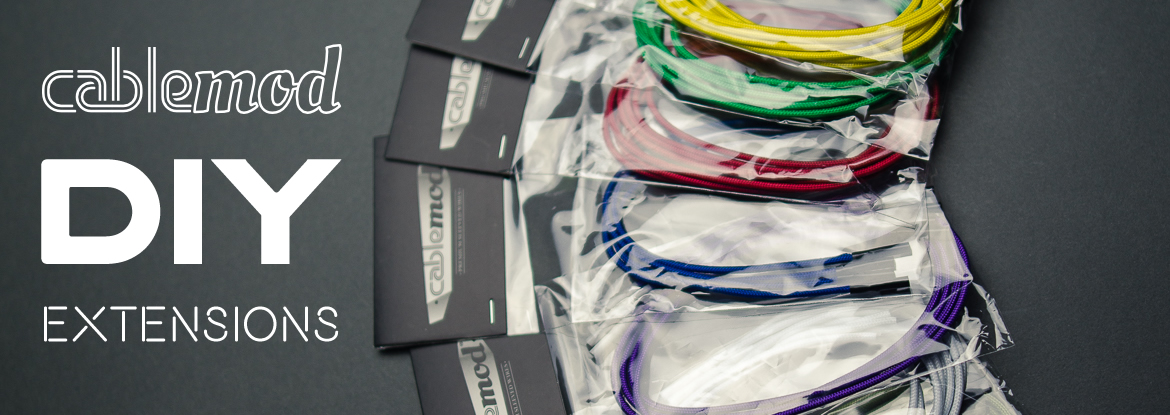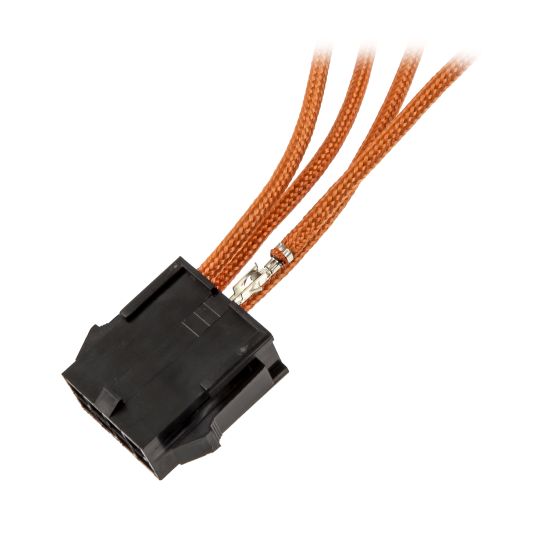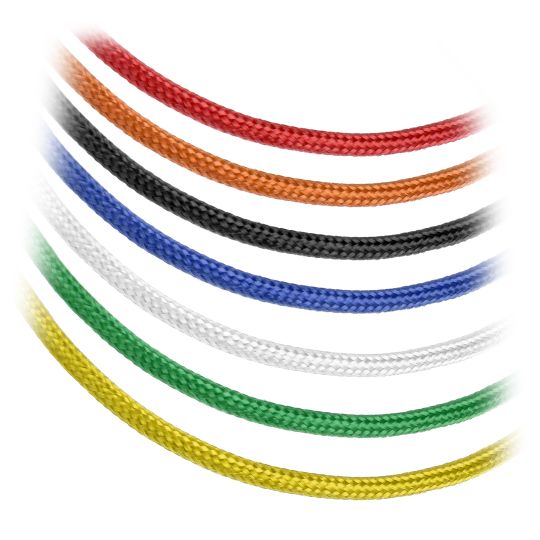CableMod Makes You Work For DIY Cable Extensions
A couple of months ago, when CableMod launched, you could only get a select number of pre-made cable kits, which were only compatible with a select set of PSUs. If your PSU didn't show up in the compatibility list, you were out of luck. Well, today you're in luck, because CableMod announced its DIY Cable Extensions. Because these are cable extensions and not replacements, they are guaranteed to be compatible with your system, even if you don't have a modular power supply.
The extensions work quite simply. Just grab a couple of CableMod Connector packs and your choice of CableMod ModFlex Sleeved Wires. When you have everything, take the wires and plug them into the matching holes in the male and female connectors. The male connectors come with a white sticker, and you're supposed to stick the end of the wire with a white protector into it. The female connectors are unmarked and require you to plug the other end of the wire with a black protector into them. Of course, don't forget to remove the protectors before plugging the wires into the connectors.
The only loss you'll have when assembling the system is that the bulk of your existing PSU cables will have to be bundled up and tucked out of sight, and not all cases will have space for that. The idea behind CableMod's cables is that they add some extra finesse to your system, the point of which would be completely defeated if you've got a bundle of old cable slack in sight.
CableMod will be selling 24-pin ATX connector packs, 8-pin EPS connectors, 4-pin ATX, 6-pin PCI Express, and 8-pin PCI Express power connectors. Other connectors, such as Molex plugs or SATA power connectors, are a bit more difficult to mod, and you can usually build systems with those placed out of sight.
The wires will be sold in packs of four, in 20 cm, 40 cm and 60 cm lengths. Color options are black, red, blue, light blue, green, light green, orange, white, purple, silver and yellow.
In the U.S., you can grab all the parts from Performance-PCs.com.
Follow Niels Broekhuijsen @NBroekhuijsen. Follow us @tomshardware, on Facebook and on Google+.
Get Tom's Hardware's best news and in-depth reviews, straight to your inbox.
Niels Broekhuijsen is a Contributing Writer for Tom's Hardware US. He reviews cases, water cooling and pc builds.
-
none12345 Not a good idea. Extending cables means voltage loss. Loss at the connector and loss over the length of the cable. As well as the mentioned cable mess to deal with. And of course dont forget the possibility of putting the pins in the wrong order(from someone who constantly wires connectors by hand, even if you have done it 1000 times, its easy to get distracted and accidentally do the pinout wrong, got to tripple check everything)Reply
Voltage loss over the cable = more amps traveling over the cable to supply the same load = more heat in your case, and higher power bills(minor but still there).
Voltage loss if not regulated correctly will also potentially cause instability issues. If something expects 12 volts and you lose 0.5 volts on your cable you are only feeding 11.5, could easily push something out of spec. Voltage loss over 18 inches of 18 gauge copper wire at 10 amps is 0.19 volts(0.3 volts if aluminum), which isnt a lot, but we are already working with low voltages, and i could easily see it being a problem with some electronics.
If you really want looks, get the modular power supply and replace the entire cable. -
AtkinsFriendly I'd agree with you None12345 (if that your real name) on the Ohms law but in this case, this isnt as bad as you think. Max cable lengths are only 60cm (~23") and the voltage loss is very minimal over that length. Much of the hardware in the PC has a fair bit of play in voltage to work optimally. Hard drives for instance usually run between 11-13volts and installing these cables onto it wont really push it out of that spectrum. Although, it wouldnt be wise to make a 6' daisy chained power cables out of these. This is a case mod and like any mod, you do run the risk of messing up and ruining the pins and damaging hardware, but if you're take the time to do it right, this is a huge time saver to get the look you want in your case and the feeling of DIY Accomplishment.Reply -
pahbi I wouldn't worry about the length. Devices in the computer are going to have voltage regulators on their input side to maintain proper operating voltage.Reply
With DIY cable extensions I'd be more worried about crossing pins or otherwise screwing up the wiring.
- P -
redgarl The biggest resistance factor would be the connector itself, but even there, it would be of the order of 1% max.Reply
If you need extra length for cable management and don't want to switch power supply, it is a cheap and easy option. I am surprised tis was never been done before. -
jtd871 If I understand these, they plug into the end of your existing PSU cables opposite from the PSU and should be pre-wired in fixed lengths. No way to mess up your wiring, as they should be wired "straight".Reply -
N3XUS_49 Your pc's components are designed to handle the little differences which, varying cable lenghts can make.Reply



